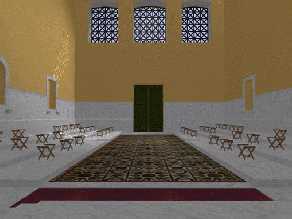
Do you want to BE a Roman Gladiator? Legionary? Centurion? General?
Senator? We've been living your dream for years!
Be the Hero!
Live the Dream.
SITE
INDEX
This site is best viewed at 1024x768
Look
for us on
Malice
the Webseries, a Phil Cook Eagle Films Production

|
The Roman Senate is composed of those Romans who have distinguished themselves politically, and have served as elected officials. The Senate controls the Treasury, votes on new legislation, and establishes policy. The Senate's duty is to ensure that Rome thrives in all her non-military aspects. The Roman Empire has
already been misconstrued as a democracy. Rome is
NOT a democracy. Only the Senators vote. A non-Senator gets no vote on the
Senate beyond the Tribune's powers or that which his/her patron may lobby
for on
their behalf. If a label must be applied to Rome, we are a Republican
Oligarchic Fascist Dictatorship. After all, we are the Roman Empire. This
system has worked exceedingly well for years. The system allows for new members to
prove themselves and move up. |
|
|
SENATE MEETINGS The Consuls will call for meetings of the Senate. A Senatorial Quorum shall be defined as such: one Consul, the Praetor, the Imperator, and two Senators (other than the Magistrates already listed) must be present. The Tribune of the Plebs need not be present. However, all proposed legislation must still be ratified by the Tribune of the Plebs. All proposed legislation must be put in writing prior to a division. At the discretion of the Consuls, there will be meetings where all Romans may attend. However, when the "Senate is in Session", be it in a back room, a tent or around a side campfire, citizens are expected NOT to interrupt their discussions and must try to ensure that the Senate is not bothered by outsiders or trivial questions. Your cooperation in this matter will be greatly appreciated. |
|
|
ORDER IN THE HOUSE . . . The Senate is presided over by the Consuls. At the beginning of the meeting, auspices should be held by the Pontifex Maximus or the ranking Augur (see Roman Religious Colleges) to determine the approval of the gods. The Consuls may then call the meeting to order. The Consuls shall introduce each topic. Only the Tribune of the Plebs may interrupt the Consuls (with a Veto). The proper order for the Consuls to call on other speakers is as follows: the Imperator, the Praetor, the Aedile, the Quaestor, followed by Consulars then other members of the Senate in order of their abundance of military awards. This is the appropriate progression. Non-Senators may be called upon to speak in open sessions, but have no actual right to speak. Of course, the Consuls may opt not to allow anyone to speak on a given topic: they operate the Senate and that is their right. A Consul, for instance, may propose a law and call for an immediate division of the Senate. ONLY Senators may vote on an issue, even in an open session. NO foreign kings may attend a Senate meeting (even as an ambassadorial representative), according to ancient tradition. Only a king's ambassador may appear before the Senate. Kings were only allowed inside Rome when chained to the back of a triumphing general's chariot. |
|
| SENATORIAL CENSVS as of 02/03/2006 | |||
|
TITLE |
FULL NAME |
STATUS |
HOUSE |
| Consul | Gurrundi Valerius Pontifex Maximus | Patrician | Valerius |
| Consul | Sextus Hostilius | Equestrian | Hostilius |
| Praetor | Lucius Veridius Lupus | Equestrian | Veridius |
| Aedile | Suetonius Rokan | Equestrian | Suetonius |
| Quaestor | Basilus Rutilus | Equestrian | Rutilus |
| Tribune of the Plebs | Arria Draconia | Plebeian | |
| Senator | Suetonius Spartacus | Equestrian | Suetonius |
| Senator | Allaricus Xirinius Dominus | Patrician | Xirinius |
| Senator | Damon Arthol Douglas | Patrician | Arthol |
| Senator | Drosylus Valerius | Patrician | Valerius |
| Senator | Maximus | Equestrian | Maximus |
| Senator | Pendin Tempest Siamicus | Patrician | Tempest |
| Senator | Suetonius Alistair Saturnalicus | Equestrian | Suetonius |
| Senator | Tobias Deloricus Desponius | Patrician | Deloricus |
| Senator | Veatrus Suetonius Saturnalicus | Equestrian | Suetonius |
